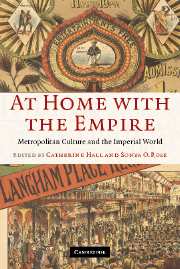Book contents
- Frontmatter
- Contents
- Notes on contributors
- 1 Introduction: being at home with the Empire
- 2 At home with history Macaulay and the History of England
- 3 A homogeneous society? Britain's internal ‘others’, 1800–present
- 4 At home with the Empire: the example of Ireland
- 5 The condition of women, women's writing and the Empire in nineteenth-century Britain
- 6 Sexuality and empire
- 7 Religion and empire at home
- 8 Metropolitan desires and colonial connections: reflections on consumption and empire
- 9 Imagining empire: history, fantasy and literature
- 10 New narratives of imperial politics in the nineteenth century
- 11 Bringing the Empire home: women activists in imperial Britain, 1790s–1930s
- 12 Taking class notes on empire
- 13 Citizenship and empire, 1867–1928
- Select bibliography
- Index
6 - Sexuality and empire
Published online by Cambridge University Press: 11 April 2011
- Frontmatter
- Contents
- Notes on contributors
- 1 Introduction: being at home with the Empire
- 2 At home with history Macaulay and the History of England
- 3 A homogeneous society? Britain's internal ‘others’, 1800–present
- 4 At home with the Empire: the example of Ireland
- 5 The condition of women, women's writing and the Empire in nineteenth-century Britain
- 6 Sexuality and empire
- 7 Religion and empire at home
- 8 Metropolitan desires and colonial connections: reflections on consumption and empire
- 9 Imagining empire: history, fantasy and literature
- 10 New narratives of imperial politics in the nineteenth century
- 11 Bringing the Empire home: women activists in imperial Britain, 1790s–1930s
- 12 Taking class notes on empire
- 13 Citizenship and empire, 1867–1928
- Select bibliography
- Index
Summary
South Asian women arriving at London's airports in the late 1970s were shocked to find that they might be required to undergo a test to determine whether they had prior sexual experience. These ‘virginity tests’ were one of the more notorious measures pioneered to weed out ‘genuine’ from ‘dishonest’ migrants of South Asian origin. Women arriving as fiancées of South Asian men already in Britain were the targets of this practice which rested on a slew of assumptions about gender and sexuality that we can trace back with little effort to colonial days. The immigration service's position was that South Asian women entering Britain as brides would be virgins, and testing them would thus identify fake applicants for entry. While public protests and well-organised women's campaigning saw this controversial test quickly abandoned, it points nonetheless, and in vivid manner, to how ideas and assumptions about colonial sexuality found expression in Britain. Examples such as this not only demonstrate the effects of its colonial past within Britain, but also reveal just how central a role sexuality has played in shaping that complex legacy.
Despite the shaping of modern Western societies around the parallel binaries of public and private and of male and female, the allegedly private world of sexuality has constantly blurred those always unstable boundaries. Fears around sexuality derive as much from the challenge this instability offers to a simple division of male and female worlds as they do from the religious proscriptions and prescriptions which have linked procreation and sexuality so tightly.
- Type
- Chapter
- Information
- At Home with the EmpireMetropolitan Culture and the Imperial World, pp. 122 - 142Publisher: Cambridge University PressPrint publication year: 2006
- 7
- Cited by



